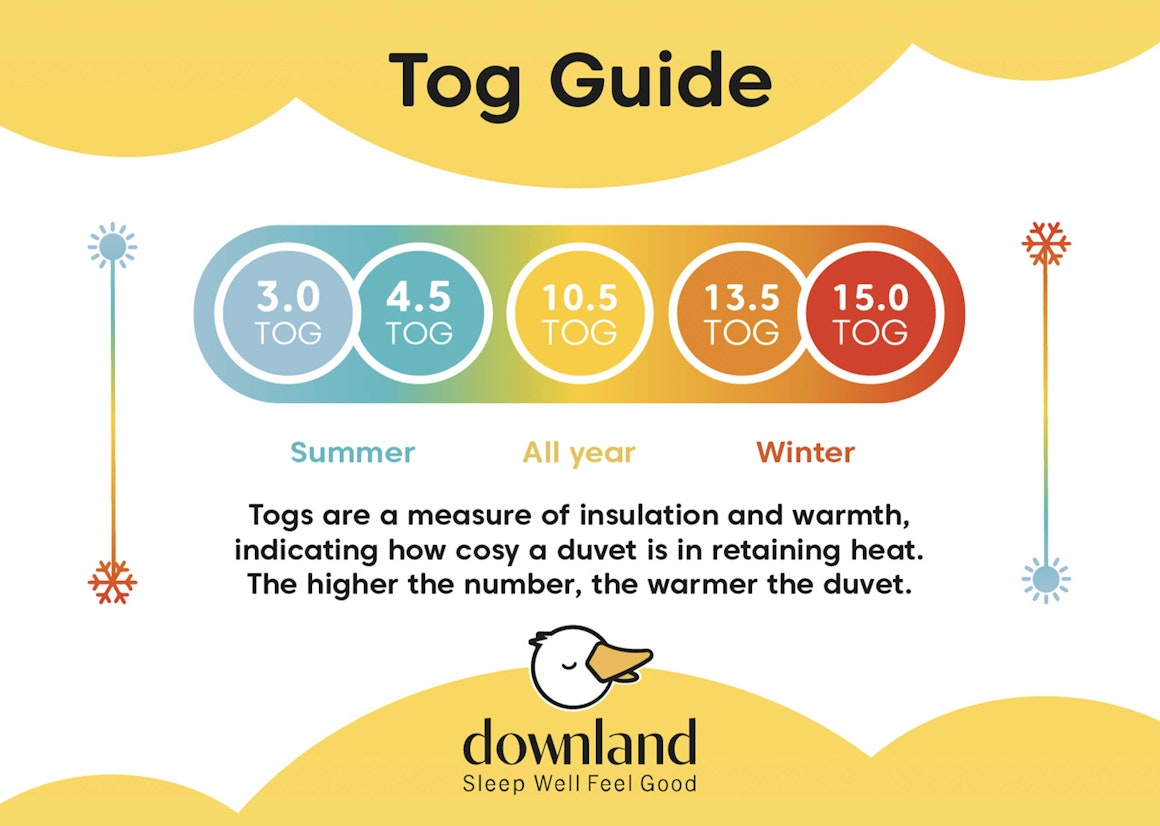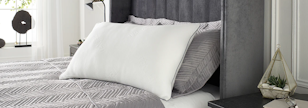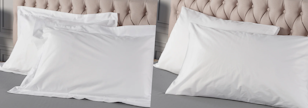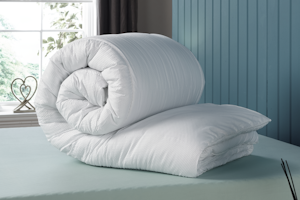30 Jun 2025
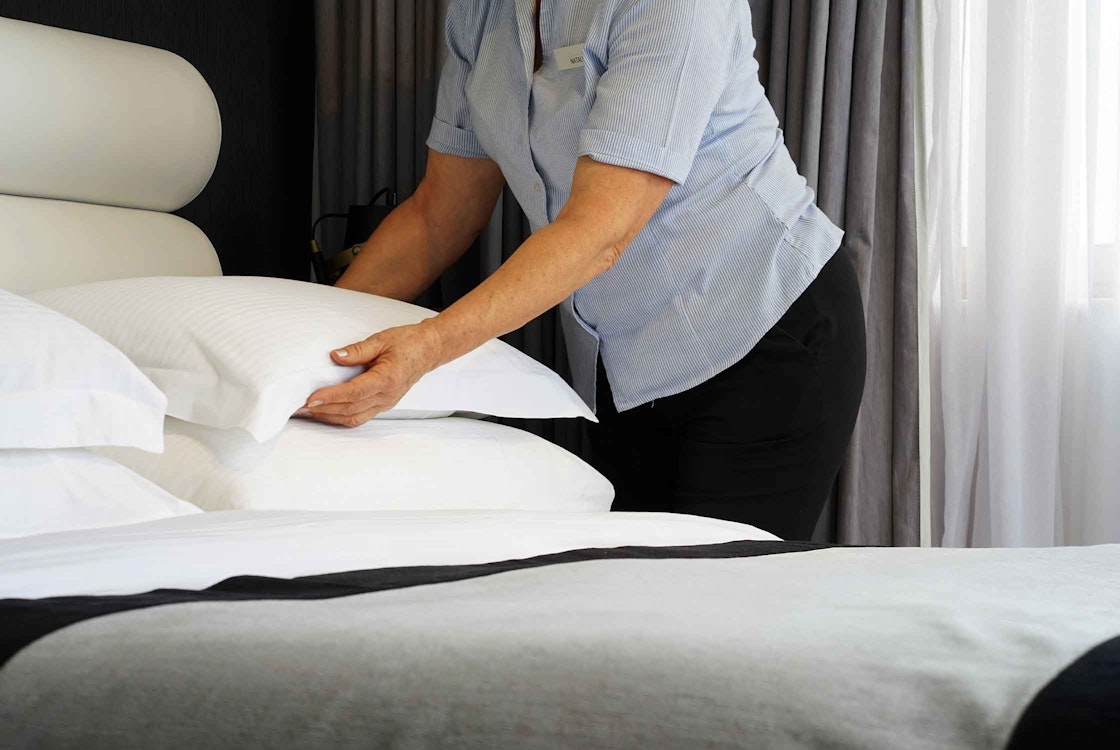
Self-Catering Bedding Advice
14 Nov 2023
Self-catering accommodation offers holidaymakers a home away from home experience, allowing them to enjoy their vacation with a sense of freedom and independence. Providing comfortable and well-thought-out bedding is essential for your guests, as it can be a major contributing factor to their overall satisfaction with your property. By understanding the basics of self-catering bedding and making the right choices, you can ensure a pleasant stay for your guests and possibly earn returning customers and positive reviews.
Holidaymakers often look for a good night's sleep and appreciate high-quality linens, pillows, and duvets. Choosing the right bedding for your property means considering factors such as the fabric, patterns, and colours, as well as ensuring you have an adequate supply of fresh linens for seamless changeovers.
Don't forget to include pillow and mattress protectors, as this not only helps maintain the cleanliness and longevity of your bedding but also provides a more hygienic environment for your guests.
Key Takeaways
- Prioritise guest comfort and preferences when selecting bedding
- Ensure an adequate supply of linens and protectors for seamless changeovers
- Provide high-quality bedding for an exceptional self-catering experience
Understanding the Basics
Types of Self-Catering Bedding
When selecting bedding for your self-catering property, it's essential to consider various factors such as material, thread count, and colours. The two main types of materials commonly used are cotton and polycotton. Pure cotton offers a soft and smooth feel, while polycotton (a mix of polyester and cotton) provides a more durable and easy-to-maintain option. Thread counts also play a significant role in the quality and comfort of bed linen. A higher thread count typically results in a softer and more luxurious feel.
- Cotton: Provides a soft, breathable, and natural option. Ideal for a more luxurious feel.
- Polycotton: Offers a wrinkle-resistant, durable, and easy-to-maintain choice. Perfect for properties with high turnover.
When choosing colours, it's practical to opt for light shades as they are easier to clean and bleach, allowing for quick swaps if necessary. A versatile and neutral colour palette also suits most interior design schemes.
Importance of Bedding Choices
Making the right bedding choices is crucial for the success of your self-catering property. High-quality bedding can contribute to a positive guest experience and improve the overall impression of your accommodation. Consider the following points when selecting bedding for your self-catering property:
- Quality: Investing in high-quality bed linen can enhance guests' comfort and promote a better night's sleep, leading to positive reviews and potential repeat bookings.
- Ease of maintenance: Opting for materials that are easy to clean, such as polycotton, can reduce the time spent on managing your property's linens.
- Appearance: Crisp and clean bedding creates an inviting and professional environment for your guests, enhancing their overall experience.
- Spare sets: Ensure you have a minimum of two sets of bedding per bed to allow for same-day guest changeovers and quick accident recovery.
By understanding the basics of self-catering bedding and carefully considering your choices, you can significantly contribute to the success of your holiday property and ensure a pleasant stay for your guests.
What are holidaymakers looking for?
When planning a self-catering holiday, guests are often looking for comfort and convenience, alongside a touch of luxury. Let's explore some factors you should consider.
Firstly, investing in quality and durable furnishings can make a substantial difference in your guests' experience. Make sure you choose bedding that is comfortable, long-lasting, and easy to maintain. Hotel-quality linen, plump pillows, and cosy duvets can elevate your guest's stay.
To help guests feel at home, consider providing some convenient amenities. Here are a few suggestions:
- Hairdryers
- Mirrors
- Hair straighteners
- Hooks on doors
- Solid coat hangers
- Waste paper baskets
Additionally, giving your holiday let a personal touch without over-personalising can create a warm and welcoming atmosphere. Try incorporating tasteful artwork, neutral colours, and a few thoughtfully chosen ornaments.
Creating an inviting outdoor space can also enhance the appeal of your holiday let. If you have the ability, you could include a small vegetable or herb patch for guests to enjoy. Alternatively, you could provide additional seating, hammocks, or a safe water feature, creating the perfect spot for guests to relax and unwind.
In conclusion, holidaymakers searching for a self-catering experience are seeking luxury, comfort, and convenience. By offering quality furnishings, thoughtful amenities, and appealing outdoor spaces, you can ensure that your guests enjoy their stay and create lasting memories.
How much bedding will you need?
When it comes to stocking your self-catering property with bedding, the following factors will influence the amount and type you'll require.
- Number of guests and beds: Consider the maximum occupancy of your property and provide sufficient bedding for each guest. It is ideal to have a couple of extra sets for emergencies or last-minute changes.
- Bed sizes: Be aware of the different bed sizes in your holiday let and purchase bedding accordingly. Typical sizes include single, double, king, and super king.
- Sheet types: Consider providing a range of bedding types to cater to different guest preferences. Polycotton and cotton are common materials, with cotton usually being more luxurious. Keep in mind thread counts as well, as higher thread counts typically indicate better quality.
- Seasonal variations: Adjust the bedding according to the season. Provide lighter blankets and duvet covers for warmer months and warmer, heavier options for cooler months.
- Turnaround time: The time between guest bookings can determine how many sets of bedding you'll need. If you have a short turnaround time, maintaining several sets will help in keeping everything fresh and ready for the next guest.
In summary, stocking up on bedding begins with understanding the essentials:
- Bed sizes
- Guest preferences
- Seasonal variations
- Turnaround times
By incorporating these aspects into your planning, you'll ensure that your self-catering property is equipped to offer a comfortable and enjoyable stay for guests.
How Many Pillows Should You Provide?
When it comes to self-catering accommodation, your guests' comfort is of utmost importance. A well-prepared bed can make a significant difference in their overall experience. Pillows play a vital role in providing a comfortable and restful sleep to your guests. Here are some tips on determining the right number of pillows for your holiday let.
Consider the size of the bed: The size of the bed plays a role in the number of pillows you should provide. For a single bed, you should typically provide two pillows. For a double or king-sized bed, four pillows are recommended. This ensures that each guest has at least two pillows to use.
Offer a variety of pillow options: Guests have different preferences when it comes to the firmness and type of pillow they find most comfortable. It's a good idea to provide an assortment of pillows for your guests to choose from. Include a mix of soft, medium, and firm options. By doing this, you can cater to their individual needs and enhance their overall satisfaction with your accommodation.
Keep spare pillows: Apart from the pillows on the bed, it's advisable to have a few spare pillows available for your guests. This not only allows them to select the perfect pillow for their needs but also helps in case of any accidents or spills.
Here's a quick reference table to help you understand the optimal number of pillows to provide:
|
Bed Size |
No. of Pillows on Bed |
Spare Pillows |
|
Single |
2 |
1-2 |
|
Double/Queen |
4 |
2-3 |
|
King/Superking |
4 |
2-3 |
In summary, ensuring that you provide an adequate number of pillows, along with a range of types and firmness levels, will help create a comfortable and welcoming environment for your self-catering guests. By considering their preferences and requirements, you can contribute to a restful night's sleep and an overall pleasant stay at your property.
Why are protectors important in a holiday let?
Protectors significantly contribute to the maintenance and hygiene of your self-catering holiday let. As a holiday let owner, you want to ensure your guests have a comfortable and clean stay.
One key reason to use mattress protectors is to prolong the life of your mattress. These protectors act as a barrier against spills, sweat, and other potential stains, preserving the quality of your mattress. A clean mattress ensures a pleasant experience for your guests.
Moreover, protectors can help with allergy management. They prevent allergens such as dust mites and pet dander from accumulating in your bedding. This creates a more allergen-free environment for your guests, ensuring a better night's sleep.
Here are some protector types to consider for your holiday let:
- Mattress protectors: Create a hygienic sleeping surface and shield the mattress from wear and tear.
- Pillow protectors: Provide a layer of protection for pillows against dirt, allergens, and odours.
- Duvet protectors: Keep duvets fresh, clean, and free from potential allergens.
By using protectors in your holiday let, you're not only saving money on replacing bedding but also reinforcing a positive guest experience. A comfortable and clean environment will ultimately lead to glowing reviews and repeat bookings.
Patterns vs Plain Bed Linen
When it comes to self-catering bedding, choosing the right bed linen can play a key role in creating a pleasant and comfortable sleep environment for your guests. In this section, we will discuss the advantages and disadvantages of patterned versus plain bed linen, and offer tips on how to make the best choice for your needs.
Patterned Bed Linen
Patterned bed linen can add a touch of personality and style to any bedroom. The variety of designs, colours, and motifs make it easy to match with your overall interior theme. Here are a few benefits and considerations when selecting patterned sheets:
- Creativity: Patterned bed linen allows you to express your unique style, making the bedroom more visually interesting.
- Hiding Stains: Due to the designs and colours, patterned bed linen may help to disguise stains and blemishes.
- Matching: Although the variety of patterns allows more potential to match with your decor, it may be trickier to find the perfect fit.
Plain Bed Linen
Plain bed linen offers a timeless and classic look to your bedroom and is often favoured for a more minimalistic approach. Here are some benefits and aspects to consider when opting for plain sheets:
- Versatility: Plain bed linen can easily match with any bedroom décor and offers a clean, simple appearance.
- Easy Maintenance: Without patterns and designs, plain sheets can be easily mixed and matched, making laundry days more efficient.
- Classy: A solid colour scheme can lend a sense of sophistication and elegance to the bedroom.
To help you decide on the perfect bed linen for your self-catering property, consider the following tips:
- Size Matters: Ensure you choose the right size bedding for the beds in your property.
- Material Quality: Opt for materials with a higher thread count and natural fibres, such as cotton, for a more comfortable sleep.
- Colour Coordination: Stick to a cohesive colour scheme to make the room more appealing to your guests.
Ultimately, the choice between patterned and plain bed linen comes down to your personal taste and the particular character of your self-catering property. By keeping these points in mind, you're sure to make an informed decision when selecting the perfect bed linen for your guests.
Duvet Tog Guide for Self Catering Bedding
A vital aspect of providing a comfortable and restful sleep experience for your guests in a self-catering property is choosing the right duvet tog. Tog is a unit of measurement that indicates how warm a duvet will be, with higher numbers indicating a warmer duvet.
Here's a general guide to help you select the ideal tog rating for your self-catering bedding:
